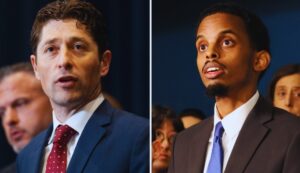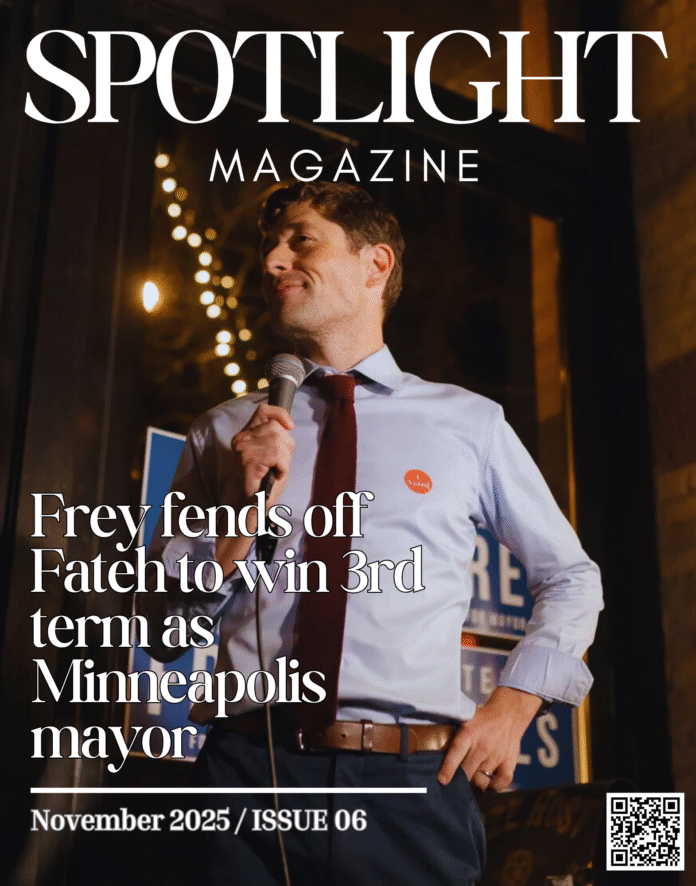In one of the most closely watched elections in Minneapolis in decades, Mayor Jacob Frey has secured a third term, narrowly defeating State Senator Omar Fateh in a race that highlighted the city’s tension between continuity and transformation. The election drew high voter turnout and intense debate over issues that have dominated the city’s public discourse in recent years, including policing, housing, and economic equity.
Frey, first elected in 2017, ran on his record of steady leadership and pragmatic governance. His campaign emphasized experience, stability, and incremental reform, framing him as the leader best equipped to guide Minneapolis through ongoing challenges while preserving its growth and resilience. Fateh, a Somali-American state senator and progressive voice, offered a contrast. He ran as an advocate for bold systemic change, promising more aggressive action on affordable housing, tenants’ rights, and community-based public safety programs. The race became a clear referendum on whether voters preferred continuity or a dramatic shift in city leadership.
The ranked-choice voting system ultimately played a decisive role in determining the outcome. Frey did not win an outright majority in the first round, but as lower-ranked candidates were eliminated and their votes redistributed, he maintained a slim lead over Fateh and emerged victorious.
The process reflected not only the competitiveness of the race but also the diversity of political perspectives among Minneapolis residents. Voters were not simply choosing between two candidates; they were signaling priorities about the city’s future, the pace of reform, and the type of leadership they wanted moving forward. Frey’s victory underscores the resilience of an incumbent who has weathered significant challenges. His two previous terms saw him navigate public scrutiny following national events, confront debates over police reform, and respond to the city’s changing economic landscape. During the campaign, he repeatedly emphasized the need for collaboration, both with the City Council and with community stakeholders, framing pragmatic action as the path toward meaningful results. He also highlighted initiatives aimed at revitalizing neighborhoods, attracting new businesses, and creating pathways for economic opportunity.
Fateh’s campaign energized younger voters and communities historically underrepresented in city politics. He brought attention to structural inequities, advocating for more inclusive governance and policies that address systemic barriers. While he fell short of victory, his influence on the election cannot be understated. The energy and ideas his campaign brought to the forefront will likely continue to shape city politics, keeping pressing issues like housing affordability and public accountability in the spotlight.
After the results were confirmed, Frey delivered a victory speech emphasizing unity, urging Minneapolis residents to come together despite the heated campaign. He called for continued dialogue and partnership with the City Council, where progressive voices maintain a slim majority, noting that cooperation will be essential for tackling the city’s ongoing challenges. Fateh also addressed the public, framing the campaign as a foundation for continued engagement and civic activism, rather than the conclusion of a movement.
Looking ahead, Frey’s third term is expected to be complex and demanding. He will need to manage a City Council that often pushes for faster, more aggressive reforms while maintaining public confidence in his administration’s capacity to deliver results. Key priorities will include addressing the housing crisis, tackling homelessness, strengthening public safety programs, and continuing to foster economic growth amid persistent social disparities. The balance between measured progress and bold action will define his legacy during this term.
Ultimately, Frey’s victory reflects a city that values experience but is also hungry for meaningful change. While the electorate chose continuity, the energy, engagement, and expectations generated by Fateh’s campaign ensure that Minneapolis’s political dialogue will remain dynamic.
Frey now begins his third term with both a mandate and a challenge: to govern effectively, bridge political divides, and respond to the city’s urgent needs while preparing Minneapolis for a future shaped by both tradition and transformation. In the wake of the election, the message is clear: Minneapolis residents are attentive, engaged, and deeply invested in the direction of their city. Frey’s win represents stability, but it is a stability under scrutiny, one that demands responsiveness, vision, and the ability to turn dialogue into tangible progress. The city enters this new chapter with anticipation, hope, and an expectation that leadership must match the high stakes of its community.


